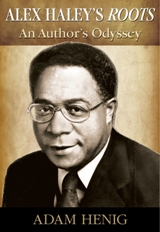Book Bloggers: Seriously?
By Adam Henig
 If a DIY author has any chance of success, he or she must be realistic and knowledgeable about how and where to get press for their book. Don’t waste your time, for instance, contacting the book review editors of the New York Times or Los Angeles Times. And for that matter, don’t even bother contacting your local daily newspaper. The newsgathering industry is dealing with its own financial demise and it is certainly not going to dedicate its space publishing a book review of an unknown author. Essentially, bypass the traditional book reviewers altogether.
If a DIY author has any chance of success, he or she must be realistic and knowledgeable about how and where to get press for their book. Don’t waste your time, for instance, contacting the book review editors of the New York Times or Los Angeles Times. And for that matter, don’t even bother contacting your local daily newspaper. The newsgathering industry is dealing with its own financial demise and it is certainly not going to dedicate its space publishing a book review of an unknown author. Essentially, bypass the traditional book reviewers altogether.
To reach prospective reviewers, (and in turn, readers), there are several avenues an author can take without spending a dime. Using popular social media sites such as Goodreads, Twitter, and Facebook are a given, but nothing is as effective about creating buzz for your publication as the Book Blogger.
A subculture unto itself thanks to websites like Blogspot and WordPress, these bloggers are the new gatekeepers of the publishing industry. Kirkus, Booklist, and Publisher’s Weeklyin several respects have been supplanted by “Amy Reads,” “Bookslut,” “Busy Mom Book Review,” and “Reads 4 Pleasure” that are calling the shots.
After sifting through endless pages of Google search results for “Book Blogs,” in hopes of establishing a cadre of potential reviewers for my own book, I began to notice a pattern among these bloggers.
From their “review policies,” it is clear that these bloggers are being inundated with lots and lots of books, most of which, I presume, do not get reviewed, let alone read. These policies in many instances are quite cumbersome.
What I found disconcerting, though, as a self-published author of a biography, which is only available electronically, I concluded that the odds of having it reviewed by one of these book bloggers are nil.
Why?
Let me explain:
- No eBooks – First and foremost, book bloggers are adamant that they will not review eBooks; they want a hard copy. Are they aware that in 2013, eBooks accounted for nearly a third of all books sold in the U.S.? More to the point, considering their blogs are only available electronically, I find their refusal to review eBooks a bit odd (and hypocritical) at such a request, but, hey, they are the gatekeepers.
- Nonfiction is non grata – Nearly all book bloggers are female. Certainly, this does not bother me on a personal level but the reality is that most women’s reading taste (i.e., fiction: fantasy, romance, coming-of-age, paranormal, food) is frequently different than generally men’s (i.e., nonfiction: biography, military history, science & technology) as demonstrated by the scores of published blogs. Clearly, I am at a disadvantage in terms of what most book bloggers are willing to review.
- Self-publishing stigma remains – The majority of bloggers refuse to review, let alone consider, books that are self-published. Certainly, I understand the need for a filter like this one. Most self-published books are poorly designed, are not professionally edited and focus on topics that are narrow in scope. However, there are a number of self-published authors (such as, Catherine Ryan Howard, Edward W. Roberston, Johnny B. Truant, David Gaughran and many others) who are on equal footing, in my view, with most seasoned writers.
Furthermore, I find it ironic that the vast majority of book bloggers themselves are neophytes in the industry. Most have no professional background when it comes to the books they examine. Only a handful have ever reviewed books for an established publication. Yet, they are willing to exclude newcomers similar to themselves.
No matter. Authors and publishers alike have figured out the value of these bloggers and are more than willing to acquiesce to their demands.
All I want is for book bloggers to remember their roots.
That is why I have taken the initiative and launched my own book blog! As part of my “indie” (a fancy word for self-published) author duties, I have dedicated space on my blog to review books that are: a) nonfiction, b) available either electronically or via hard copy, c) and do not impose a “no self published book” clause.
In the age of Amazon, anyone, literally, either can be an author or a reviewer. I understand refusing to review books you’re not interested in reading, but don’t discriminate based on who is the publisher or the nature of the format.
 Adam Henig is the author of Alex Haley’s Roots: An Author’s Odyssey (2014). A book reviewer, Adam’s writings have appeared in San Francisco Book Review, Tulsa Book Review, The Indie Writer Network Daily and Blogcritics. To read his blog, visit www.adamhenig.com.
Adam Henig is the author of Alex Haley’s Roots: An Author’s Odyssey (2014). A book reviewer, Adam’s writings have appeared in San Francisco Book Review, Tulsa Book Review, The Indie Writer Network Daily and Blogcritics. To read his blog, visit www.adamhenig.com.
